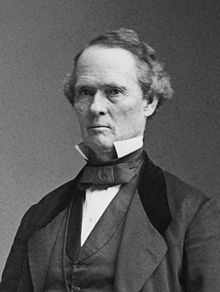Joseph Lane
| Joseph Lane | |
|---|---|
 |
|
|
United States Senator from Oregon |
|
|
In office February 14, 1859 – March 4, 1861 |
|
| Preceded by | position created |
| Succeeded by | James W. Nesmith |
|
Delegate to the U.S. House of Representatives from Oregon Territory's At-large congressional district |
|
|
In office March 4, 1851 – February 14, 1859 |
|
| Preceded by | Samuel Thurston |
| Succeeded by | position dissolved |
| 1st Governor of Oregon Territory | |
|
In office March 3, 1849 – June 18, 1850 |
|
| Preceded by | George Abernethy (provisional governor) |
| Succeeded by | Kintzing Prichette |
| Member of the Indiana House of Representatives | |
|
In office 1822–1823 1830–1833 1838–1839 |
|
| Personal details | |
| Born |
December 14, 1801 Buncombe County, North Carolina |
| Died | April 19, 1881 (aged 79) Roseburg, Oregon |
| Political party | Democratic |
| Spouse(s) | Polly Hart |
| Occupation | general, politician |
| Signature | |
| Military service | |
| Allegiance | United States of America |
| Service/branch | United States Army |
| Years of service | 1846–1848 |
| Rank | Brigadier General |
Joseph "Joe" Lane (December 14, 1801 – April 19, 1881) was an American politician and soldier. He was a state legislator representing Evansville, Indiana, and then served in the Mexican–American War, becoming a general. President James K. Polk appointed Lane as the first Governor of Oregon Territory. When Oregon was admitted as a state in 1859, Lane was elected one of Oregon's first two U.S. Senators.
In 1860, Lane was nominated for Vice President of the pro-slavery Southern wing of the Democratic Party, as John C. Breckinridge's running mate. Lane's pro-slavery views and sympathy for the Confederate States of America in the Civil War effectively ended his political career in Oregon.
A son was later elected U.S. Representative and a grandson U.S. Senator, making Lane the patriarch of one of the state's most prominent political families.
Joseph Lane was born in Buncombe County, North Carolina, on December 14, 1801, to a family of English extraction with roots in colonial Virginia. His father, John Lane, was a veteran of the American Revolutionary War. The Lane family moved to the state of Kentucky from North Carolina when Joseph was a young child.
Lane left home at the age of 15, and was married four years later. He moved to Evansville, Indiana in 1820. Lane and his wife, Polly Hart Lane, had ten children.
Lane was largely self-educated, learning about the world from books which he read at night. During the daytime he worked and saved his money, investing it shortly in the purchase of a flatboat, with which he transported freight up and down the Ohio River. Financial success followed.
...
Wikipedia
